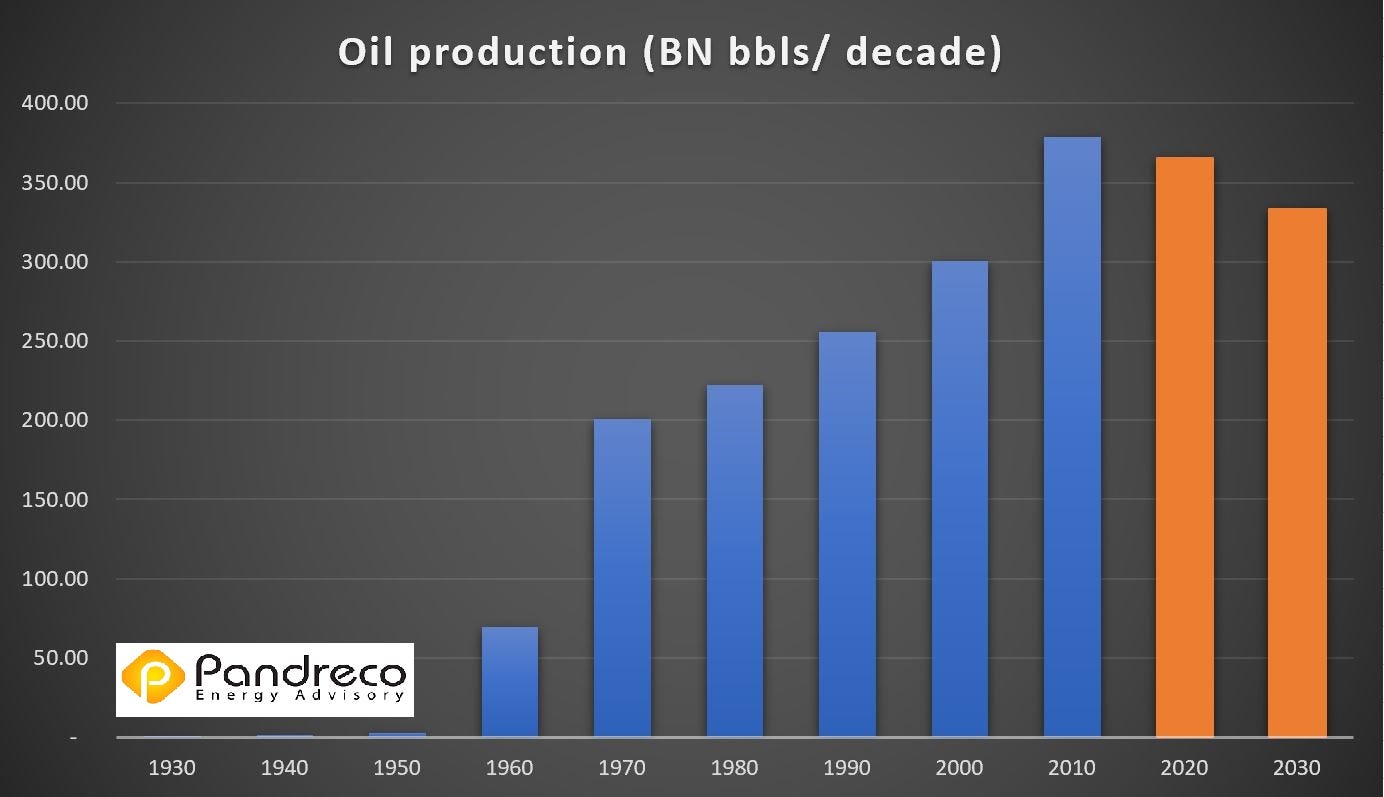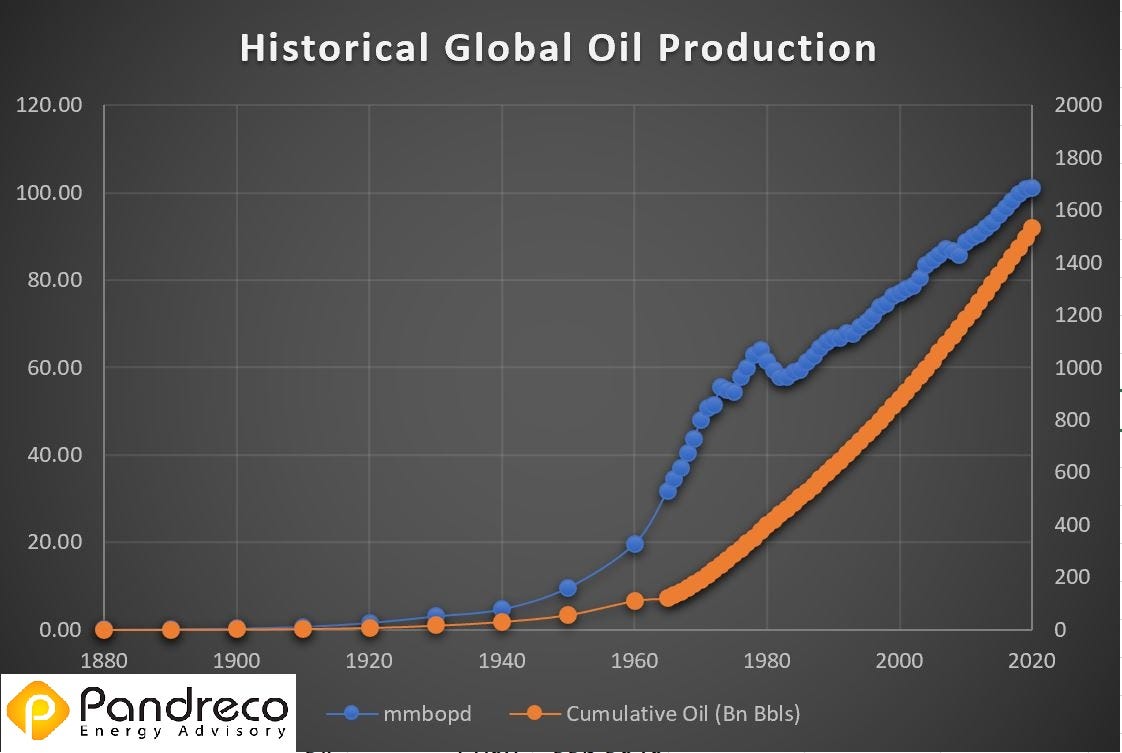A great skill in STEM (also in finance, when dealing with restaurant bills and trying global blackmail) is to be able to do rough estimates: to have a feel for orders of magnitude. In Angola in about 1996 - I paid 10x the price of fuel after filling my Jeep - simply didn’t do the math with the exchange rate leading to some very big numbers due to hyper-inflation. One petrol attendant was very happy that day because everything was paid in cash. Luckily, because fuel was about US 5c/litre it didn’t bankrupt me either; but lesson learned.
Back Of A Very Big Envelope
The world uses one hundred million barrels of oil per day (plus or minus a bit, depending on what you count as oil)
Is that a lot?
Clearly, the answer is yes, but how big is big? When we think about “Peak Oil”, “Peak Demand”, “Phasing out Oil” - what is that?
This is a picture of 7506 nicely coloured oil barrels made into a sculpture by Christo in London in 2018. Not sure if this was meant to be a savage commentary on something or just a big bath toy - but it helps understand scale.
7506 is much smaller than 100 million. So how big is 100 million?
I guess we could extrapolate to see what a 100 million barrel sculpture would look like - but maybe a simpler exercise is to think of 1 barrel as 1 second. In this case:
7506 seconds is 2 hours, 5 minutes and 5 seconds. Let’s call it 2 hours
100 million seconds is 3 years, 2 months +
So yes, that is a big sculpture, but it represents a vanishingly small fraction of the oil the world uses in a single day.
I Wouldn’t Start Here If I Were You
The other problem with such a big number is that we use that much oil every day. Every day.
And when we think about “Energy Transition” scenarios, pathways or roadmaps - it is easy to forget that starting from a very big number has consequences. The main one being that even a rapid transition means a lot of continuing usage as the forecast transition unfolds (clearly the same is true for coal and gas).
100 million barrels/d is 36.5 billion barrels a year. And for the sake of stretching the analogy….
36.5 Bn Bbls would equal roughly 1157 years at 1 bbl=1 second.
Next, we can calculate the volumes of oil needed to fulfil demand in “Rapid Transition (RT) Scenarios”. Back in 2019 I took BPs RT Scenario that dropped demand to 80 million bbls/day by 2040 and ran the numbers.

For a back-of-the envelope calculation I started at a round 100 million barrels a year in 2019, stabilizing at 101 mmbbls/y in 2020-2024 and started the decline in 2025 (lol) then matched the BP RT decline scenario. This is much faster than any “business as usual scenario”, and yet the volume of oil required to meet that curve would be about 700 billion barrels over the period 2020-2040.
To put this in context - in the whole history of the oil industry, the world has produced and consumed roughly 1,500 Billion Barrels. So in a Rapid Transition scenario, the world will consume a volume equal to roughly half of all the oil ever produced - in just the next twenty years. Therein lies the problem of starting with such big numbers.
There are many other questions - how does existing production decline? how will new discoveries and/or new technology help fill the supply gap? will demand decline faster or more slowly? These are all interesting - but for today I just want to leave this idea of thinking about “scale” and how we deal with really big numbers when talking about the energy transition.
I doubt many people in the oil industry would have guessed that we will need a volume equivalent to 50% of all the oil ever produced in just the next 20 years - in a rapid transition scenario.
Is it any wonder that the public seem to think that Just Stopping Oil is just an easy a hop skip and a jump from phasing out coal1?
which of course has happened to UK power generation, but clearly not at all on a global scale








Good article!
Along the same lines:
Part per million (ppm) = milligrams of a material in a kilogram of the whole.
You've reminded me of an issue I have with Elon Musk....and others.....along these lines.
On the Joe Rogan podcast (approaching 20 million subscribers) from 10/31/23 there was this brief exchange:
Musk: You could actually power the entire United States with 100 miles by 100 miles of solar.
Rogan: Really?
Musk: Yes.
Rogan: So you could just pick some dead spot that you fly over....
Musk: Of which we have plenty
Rogan: .....Cover that sucker up with solar panels and charge the whole country?
Musk: Absolutely.
Rogan: 24/7?
Musk: You'd need batteries, but yes.
Rogan: Wow
Musk: Yeah, it's not hard. Meaning it's very feasible.
I have no educational background or work related experience on the topic, but it certainly seems from what I've read from Substack authors that Musk's comments here are massively oversimplifying an incredibly complex issue. I've been highly skeptical of him ever since.